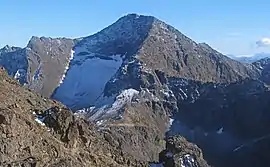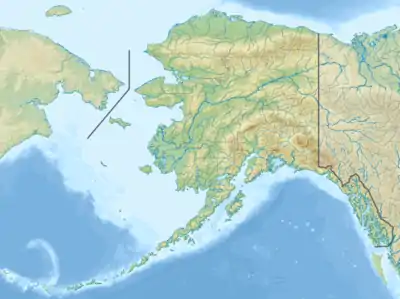Mount Williwaw
Mount Williwaw is a prominent 5,445-foot (1,660 m) mountain summit located in the Chugach Mountains, in Anchorage Municipality in the U.S. state of Alaska. Mount Williwaw, the highest peak of the Chugach Front Range, is situated in Chugach State Park, 12 mi (19 km) southeast of downtown Anchorage, and 1.4 mi (2 km) northeast of The Ramp. The Williwaw Lakes lie below the north and west slopes of the mountain and provide pleasant campsites for climbers not wanting to climb the mountain in one arduous day. The mountain's name was officially adopted in 1964 by the United States Geological Survey based on a recommendation by the Mountaineering Club of Alaska because an infantry company from nearby Fort Richardson was caught in a williwaw near this mountain in May 1962. Three men died of exhaustion before the group was rescued.[2] The first ascent of this peak was made June 11, 1965, by David Judd, M. Judd, Myers, and Parker via the South Ridge.[3]
| Mount Williwaw | |
|---|---|
 Mount Williwaw seen from Mt. Elliott | |
| Highest point | |
| Elevation | 5,445 ft (1,660 m) [1] |
| Prominence | 3,245 ft (989 m) [1] |
| Coordinates | 61°06′13″N 149°30′52″W [1] |
| Geography | |
 Mount Williwaw Location of Mount Williwaw in Alaska | |
| Location | Chugach State Park Anchorage Municipality, Alaska United States |
| Parent range | Chugach Mountains |
| Topo map | USGS Anchorage A-7 |
| Climbing | |
| First ascent | 1965 |
| Easiest route | Scrambling class 3 |
Climate
Based on the Köppen climate classification, Mount Williwaw is located in a subarctic climate with long, cold, snowy winters, and mild summers.[4] Temperatures can drop below −20 °C with wind chill factors below −30 °C. Precipitation runoff from the peak drains into Ship Creek and Campbell Creek.
References
- "Mount Williwaw, Alaska". Peakbagger.com. Retrieved 2019-06-04.
- "Mount Williwaw". Geographic Names Information System. United States Geological Survey. Retrieved 2019-06-04.
- Vincent Hoeman, The Western Chugach Range, Alaska, American Alpine Journal, 1966
- Peel, M. C.; Finlayson, B. L.; McMahon, T. A. (2007). "Updated world map of the Köppen−Geiger climate classification". Hydrol. Earth Syst. Sci. 11: 1633–1644. ISSN 1027-5606.
Gallery
- Views of Mt. Williwaw
.jpg.webp) Mt. Williwaw to right
Mt. Williwaw to right.jpg.webp) Mt. Williwaw in background
Mt. Williwaw in background.jpg.webp) Williwaw Lake with Mt. Williwaw to right
Williwaw Lake with Mt. Williwaw to right.jpg.webp) Mt. Williwaw seen from Mount Elliott
Mt. Williwaw seen from Mount Elliott
External links
- Weather forecast: Mount Williwaw
- Climbing Williwaw's northwest ridge: YouTube